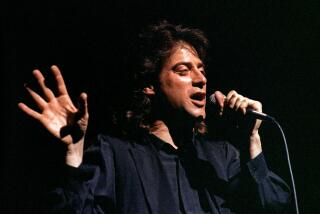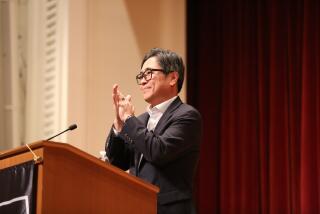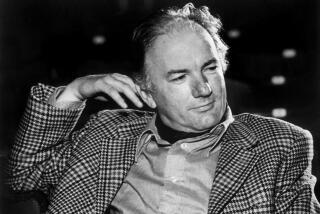Richard Eberhart, 101; Winner of Pulitzer Prize and U.S. Poet Laureate
- Share via
Richard Eberhart, Pulitzer Prize-winning poet who wrote about life and death with intense ferocity but used his genial demeanor to encourage generations of aspiring poets, has died. He was 101.
Eberhart died Thursday in Hanover, N.H., after a short illness, announced Dartmouth College, where he taught for nearly 30 years.
In a career that spanned more than six decades, Eberhart wrote more than a dozen books of poetry and verse drama, winning the Pulitzer in 1966 for “Selected Poems: 1930-1965.” He received almost every major award a poet can win, for penning such stark verse as the first four lines from “The Groundhog” (1936):
In June, amid the golden fields,
I saw a groundhog lying dead.
Dead lay he; my senses shook,
And mind outshot our naked frailty.
“I saw so many poets come through his door and seek him out,” said Jay Parini, who joined Eberhart as a Dartmouth professor in 1975 and considered him a mentor. “He was a poet of real achievement.”
Eberhart saw himself as the last of a breed of academic poets, especially after he helped call attention to the Beat Generation poets, singling out Allen Ginsberg, in a 1956 piece in the New York Times.
When a small group gathered for Eberhart’s 95th birthday, Ginsberg was among those who attended.
“Ginsberg stood up and said, ‘This has been one of the most important friendships I’ve had in poetry,’ ” Parini, a novelist and poet who now teaches at Middlebury College, told The Times on Monday. “Even though his work was formal and always kind of old-fashioned, Dick loved all kinds of poetry.”
He looked at poems partly as “spells against death,” he said in 1979. “They are milestones to see where you are now, to perpetuate your feelings, to establish them. If you have in any way touched the central heart of mankind’s feelings, you’ll survive.”
Richard Ghormley Eberhart was born April 5, 1904, into a well-to-do family in Austin, Minn. He once recalled writing his first serious poetry in high school. When most students would turn in the required poem for homework, he would show up with five or 10.
He had spent a year at the University of Minnesota when his mother died of cancer. Later in life, he would point to his mother’s death as the turning point that made him seriously pursue poetry. When his father’s business failed, he transferred to Dartmouth, where he earned a bachelor’s degree in 1926 and was a student of Robert Frost’s.
After he worked his way across the South Pacific as a steamship crewman, he earned a second bachelor’s in 1929 from St. John’s College at Cambridge University.
He returned to the U.S. just before the stock market crash, held several odd jobs -- including tutoring the son of King Prajadhipok of Siam (now Thailand) -- and attended Harvard for a year before returning to Cambridge and earning a master’s in 1933.
He rode out much of the Depression teaching English at St. Mark’s School, an Episcopal boys school in Southborough, Mass., from 1933 to 1941.
When W.H. Auden wanted to emigrate from England, Eberhart got him a job at the school, Parini said.
During World War II, Eberhart became a Navy gunnery instructor. One of his best-known poems, “The Fury of Aerial Bombardment” (1947), came out of his war experience. The last stanza is typical of the simplicity and directness for which his lyric poems are known:
Of Van Wettering I speak, and Averill,
Names on a list, whose faces I do not recall
But they are gone to early death, who late in school
Distinguished the belt feed lever from the belt holding pawl.
In 1941, he married Helen Elizabeth Butcher, whose great-grandfather founded the Butcher Polish Co., makers of floor wax. Unable to make his living as a poet, Eberhart spent seven years in the floor care business.
After posts at several universities, Eberhart became an English professor at Dartmouth in 1956. From 1959 to 1961, he succeeded Frost as poet laureate of the U.S. In 1970, he partially retired from Dartmouth but continued teaching part-time until the mid-1980s.
He won the Bollingen Prize for Poetry, awarded for his body of work, from the Yale University Library in 1962 and the National Book Award for “Collected Poems, 1930-1976” in 1977. From 1979 to 1984, he was New Hampshire’s poet laureate.
As an outdoorsman, he could be as fierce and bold as his poetry.
The “energetic man of insane high spirits” cross-country skied until he was 90, Parini said.
For more than four decades, Eberhart summered in Maine, where the poet, as captain of his boat, could be seen ferrying around his circle of poets, writers and artists.
Eberhart’s wife died in 1993. He is survived by a daughter, Gretchen Eberhart Cherington, of Meriden, N.H.; a son, Richard, of Phippsburg, Maine; and six grandchildren.
A memorial service will he held in the Rollins Chapel at Dartmouth at 2 p.m. Sunday.
Memorial gifts to benefit the Richard Eberhart Poetry Prizes, established by his family in the poet’s hometown to honor young poets from kindergarten through grade 12, may be sent to the Austin Public Education Foundation, P.O. Box 878, Austin, MN, 55912.
More to Read
Sign up for our Book Club newsletter
Get the latest news, events and more from the Los Angeles Times Book Club, and help us get L.A. reading and talking.
You may occasionally receive promotional content from the Los Angeles Times.











